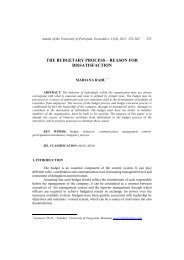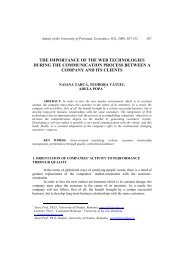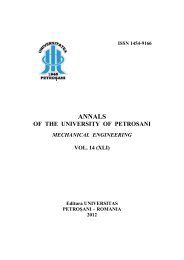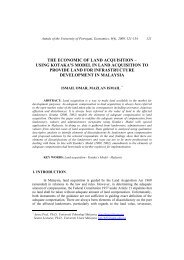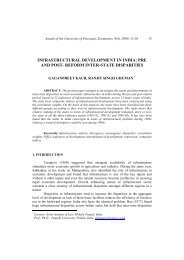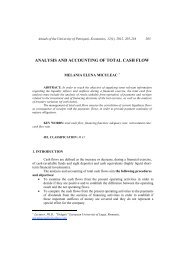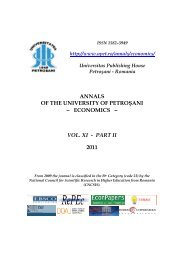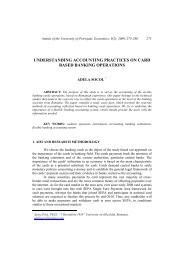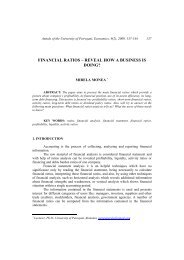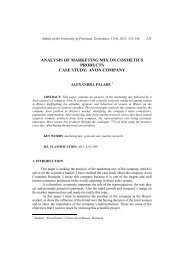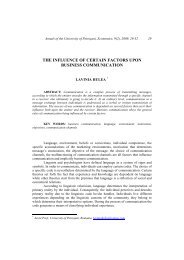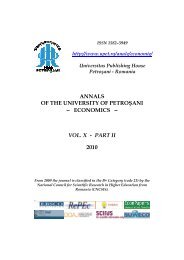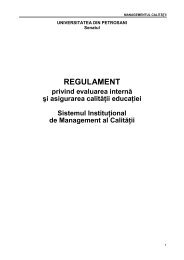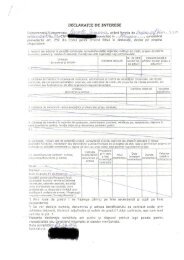annals of the university of petroÅani â¼ economics â¼ vol. xi - part i ...
annals of the university of petroÅani â¼ economics â¼ vol. xi - part i ...
annals of the university of petroÅani â¼ economics â¼ vol. xi - part i ...
Create successful ePaper yourself
Turn your PDF publications into a flip-book with our unique Google optimized e-Paper software.
172 Nagy, C.M. ; Cotleţ, D.<br />
promise <strong>of</strong> payment <strong>of</strong> compensation, <strong>the</strong> company establishes a premium reserve if it<br />
has to repay <strong>part</strong> <strong>of</strong> <strong>the</strong> premiums.<br />
2. DEFINITION OF TECHNICAL RESERVES<br />
General insurance companies must constitute technical reserves relating to past<br />
and future liabilities arising from insurance contracts written in <strong>the</strong> reference year.<br />
Insurance companies which are engaged in <strong>the</strong> life insurance business are<br />
required by law 1 to establish and maintain technical reserves, referred to as<br />
ma<strong>the</strong>matical reserves for <strong>the</strong> life insurance fund.<br />
Technical reserves must have at any time an amount sufficient to enable <strong>the</strong><br />
company to move forward, to <strong>the</strong> extent <strong>of</strong> what is reasonably foreseeable, <strong>the</strong><br />
commitments arising from insurance contracts 2 .<br />
“Specific for insurance companies is <strong>the</strong> establishment <strong>of</strong> technical reserves,<br />
namely: <strong>the</strong> premium reserve, life insurance technical reserves (ma<strong>the</strong>matical reserve,<br />
reserve for bonuses and rebates on life insurance, o<strong>the</strong>r technical reserves), reserve for<br />
insurance damage done separately for general and life insurances, <strong>the</strong> reserve for<br />
bonuses and rebates on general insurance, <strong>the</strong> equalization reserve and o<strong>the</strong>r reserves<br />
relating to general insurance.” (Cistelecan Rodica, et al., 2006)<br />
“Technical reserves are estimates <strong>of</strong> future payments for risks produced in <strong>the</strong><br />
past (for general insurance) or for those that will occur in <strong>the</strong> future (for life<br />
insurance) and <strong>the</strong> value <strong>of</strong> technical reserves should allow <strong>the</strong> insurer, at any time, to<br />
honor its commitments arising from <strong>the</strong> insurance contracts.” (Nagy Cristina Mihaela,<br />
Trif Viorel, 2010, pp 604)<br />
According to law 32/2000 3 insurance companies engaged in <strong>the</strong> general<br />
insurance business are required to establish and maintain <strong>the</strong> following technical<br />
reserves: <strong>the</strong> premium reserve, loss reserve, unreported loss reserves, catastrophe<br />
reserves, <strong>the</strong> reserve for unexpired risks, <strong>the</strong> equalization reserve.<br />
Reserves are established during <strong>the</strong> conduct <strong>of</strong> business at a level at least equal<br />
to <strong>the</strong> total compensation <strong>of</strong> <strong>the</strong> previous financial year.<br />
The value <strong>of</strong> technical reserves should allow <strong>the</strong> insurer, at any time, to honor<br />
its commitments arising from insurance contracts.<br />
3. SPECIFIC ASPECTS OF THE TECHNICAL RESERVES<br />
ACCOUNTING<br />
The formation <strong>of</strong> <strong>the</strong>se reserves is different from <strong>the</strong> constitution <strong>of</strong> reserves<br />
from commercial companies, being made based on costs, having a role in predicting<br />
<strong>the</strong> future insurance claims.<br />
1 Law 32/2000 updated in January 2011, art. 21, paragraph (3)<br />
2 Rule no.5/2001 on calculation and record <strong>of</strong> minimum technical reserves for general<br />
insurance, issued by <strong>the</strong> Insurance Supervisory Commission, reprinted.<br />
3 Law 32/2000 updated in January 2011, art. 21, paragraph (1)



